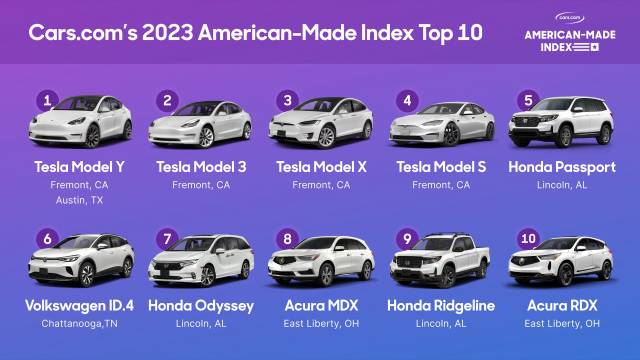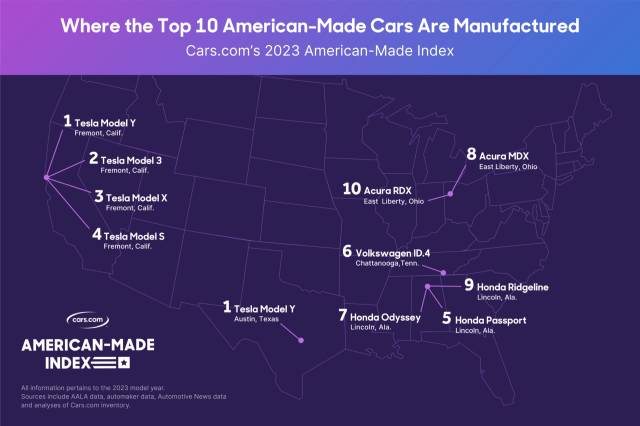Tesla, Honda dominate most American-made cars list
If you were to purchase a new Toyota Tundra pickup truck, you’d be contributing more to the American economy than if you bought a new Ford F-150, based on the annual American-Made Index published Wednesday by Cars.com.
The annual index largely follows the American Automobile Labeling Act (AALA) for parts sourcing shown on the Monroney stickers of new passenger vehicles. Some F-150s may be built in its hometown of Dearborn, Mich., but only 30% of its parts are made in the U.S. (and Canada), while its 3.5-liter and 5.0-liter engines are made in Mexico, according to data from the AALA.
Built in San Antonio, the Toyota Tundra, sources 60% of its parts domestically (and only 15% from its home country of Japan), but its engines are made in the U.S. There are other factors at play, but it contributes to Cars.com ranking the Tundra as the 12th most American-made vehicle, whereas the gas F-150 made in Claycomo, Miss., ranks number 66. Dearborn-made hybrid and battery electric versions of the F-150 ranked higher, at 61 and 38 for the F-150 Lightning.
The index does not factor in sales volume, so it’s not an assessment of auto sales on the domestic economy as a whole. The F-150 remains the bestselling vehicle in America, and thus has an outsized effect on the domestic economy.
Instead, the index provides a touchstone in the murky field of where the money of a new car purchase goes, and who it benefits. That appears to be important to at least 48% of the people, who, in a complementary survey of 1,013 in-market shoppers, said they were willing to pay more for a new car if it contributes to or creates more U.S. jobs.
The unequivocal leader in making American cars is the lightning rod known as Tesla. Headquartered in Austin, Texas, and with factories there and in Fremont, Calif., it’s the only automaker on the index that has 100% of its U.S. sales come from domestic manufacturing. Its four available models took the top four spots on the list, led by the Tesla Model Y, which was the second bestselling vehicle behind the F-150 in the first quarter of 2023.
“Tesla debuted on the index just three years ago, but with headquarters and significant operations in the U.S., its rise shuffled the deck, displacing many traditional domestic manufacturers,” Jenni Newman, Cars.com editor-in-chief, said in a statement.

2023 American-Made Index top 10, according to Cars.com
The Tundra may not be the only surprise in the list, which is capped at the top 100 vehicles out of a possible 388 vehicles based on Cars.com new car inventory and an in-person audit of nationwide dealers. The fifth most American-made vehicle was the Honda Passport, followed by the Volkswagen ID.4 electric crossover that shifted production from Germany to Chattanooga, Tenn., late last year. Rounding out the top 10 are other Honda/Acura vehicles.
The presence of Honda and Acura at the top of the list is nothing new, but the arrival of other brands reflects broader manufacturing patterns. Michigan still reigns as the state producing the most models included on the list, but a southern storm of new developments shows a new manufacturing hotbed, including Nissan and Volkswagen in Tennessee, Honda and Hyundai in Alabama, Kia in Georgia, and Toyota in Kentucky, Texas, and Indiana. The number of factories in the south has increased 15% from 2020, according to Cars.com.

2023 American-Made Index top 10, according to Cars.com
While individual models from Detroit’s big three automakers may not have cracked the top 10, they still account for a significant showing in the top 100 and a major contributor to the overall economy. Domestic assembly of Ford and Lincoln models accounted for 77.5% of the brands’ U.S. sales. General Motors’ vehicles accounted for 18%, or 18 models, on the index of 100 vehicles. Toyota comes in second, accounting for 11 models on the list.
Other criteria for the index includes: country of origin of transmissions, country of origin for engines, U.S. manufacturing workforce, location of final assembly, and percentage of U.S. and Canadian parts.
Additional parameters of the study were that a vehicle can’t be too heavy, nor can its sales volume be too low. Newman wouldn’t disclose the level of those thresholds, but other electric vehicle automakers headquartered in the U.S. and with domestic production didn’t qualify: The Lucid Air due to low sales volume, and the Rivian R1T and R1S due to their weight. Presumably, the exclusion follows the AALA, which does not apply to passenger vehicles with a gross vehicle weight rating (GVWR) of more than 8,500 pounds. The Rivian R1T pickup truck and Rivian R1S three-row SUV have a GVWR of 8,532 pounds.
The methodology hasn’t been updated since 2020, but it likely will be to reflect the influence of the Inflation Reduction Act finalized in 2023 that incentivizes domestic electric vehicle development and production. For more on the 18th annual American-Made Index study, visit Cars.com.

